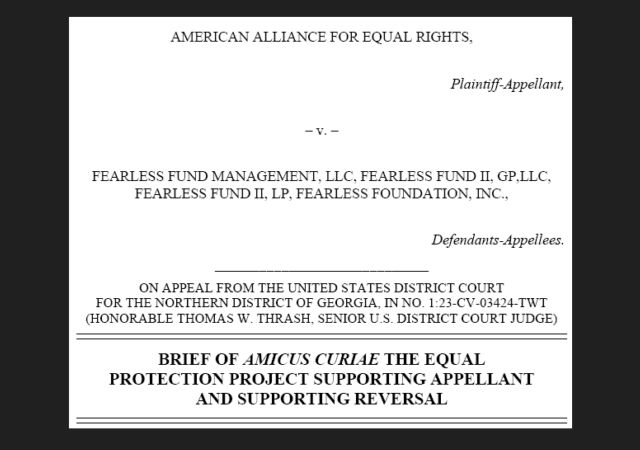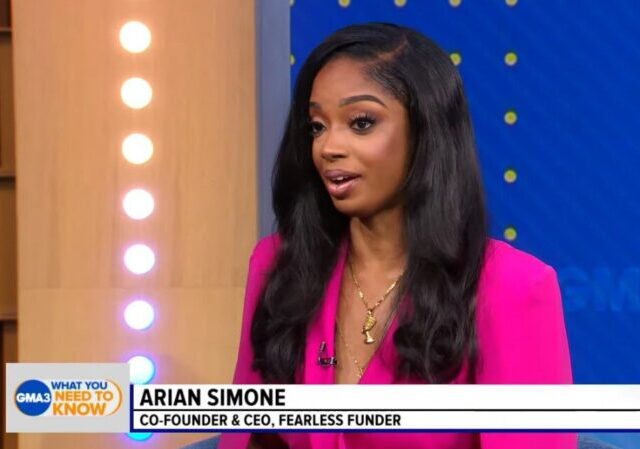Equal Protection Project Files Brief Opposing Black-Women-Only Grant Program in “Fearless Fund” Appeal
District Court found racially-exclusive contracting was protected speech. In our brief in the 11th Circuit, Equal Protection Project argues: “this court must reverse the district court’s erroneous order that Appellees’ First Amendment speech rights trump conduct covered by 42 U.S.C. § 1981.”

The Equal Protection Project (EqualProtect.org) has been tracking a case out of Atlanta where a hedge fund type entity sponsored a grant contest open only to Black women, and in September we were disturbed to find out that a federal district court judge had ruled in favor of the racially discriminatory program:
Affirmative Action sure does make strange alliances. In this case, a desire to defend a grant program open only to black women may bring down the entire anti-discrimination legal infrastructure that has been in place for over 150 years, if a District Court ruling that racially discriminatory contracting is “speech and expression” protected by the First Amendment is not reversed.
The American Alliance for Equal Rights (AAER), a group formed by Ed Blum, whose Students for Fair Admissions won the Harvard affirmative action case, sued Fearless Fund in federal court for the Northern District of Georgia over a grant program open only to black women. The claim was brought under a post-civil war statute prohibiting discrimination in contracting, not under the Equal Protection Clause of the 14th Amendment (which arguably would not apply to a private investment company) or other discrimination statutes. You can read the Complaint and Motion for Preliminary Injunction….
I was floored when I read the Judge’s comments and reasoning, which provided in pertinent part:
I’m going to deny the Plaintiff’s motion for a preliminary injunction for these reasons: I don’t think the Plaintiff has shown sufficient likelihood of success on the merits to grant the extraordinary relief of a preliminary injunction….
The Defendants, in my opinion, have a message that they are trying to communicate that black women business people have suffered discrimination and lack of equal access to capital to begin, expand, and promote businesses. And the Defendants, with their grants, are trying to send a message that they recognize that and want to support black female business people with their charitable donations.
Under the controlling Eleventh Circuit authority of Coral Ridge Ministries media, donating money qualifies as expressive conduct and is entitled to First Amendment protection. That was not a 1981 case, but I have no reason to believe that the Eleventh Circuit would have decided the case any differently under Section 1981.
[emphasis added]
Wait, what? Did the judge really rule that racially discriminatory contracting is expression protected by the First Amendment? Can’t be, that goes against the entire body of law, and if true, would eviscerate a wide range of civil rights laws…..
The absurd implications of the District Court Order are apparent. Can a building owner say that having a “whites only” bathroom is speech and expression entitled to First Amendment protection. You probably can think of dozens of other counter-examples.
 Fortunately, the Plaintiff, AAER, filed an emergency motion to stay the district court’s ruling with the 11th Circuit U.S Court of Appeals, who granted the motion, as we reported: Black-Women-Only Grant Program Halted, 11th Circuit Issues Injunction Pending Appeal in Fearless Fund Case:
Fortunately, the Plaintiff, AAER, filed an emergency motion to stay the district court’s ruling with the 11th Circuit U.S Court of Appeals, who granted the motion, as we reported: Black-Women-Only Grant Program Halted, 11th Circuit Issues Injunction Pending Appeal in Fearless Fund Case:
The Court of Appeals for the 11th Circuit just issued an Injunction Pending Appeal completely rejecting the District Court’s use of the First Amendment to excuse discriminatory contracting….
The plaintiff’s motion for an injunction pending appeal is GRANTED. An appellant may secure an injunction pending appeal if it establishes a substantial likelihood of success on the merits, irreparable injury in the absence of an injunction, and that the balance of the equities and public interest weigh in favor of an injunction. See Tandon v. Newsom, 141 S. Ct. 1294, 1297 (2021). For the reasons stated in the plaintiffs motion for an injunction, we conclude that the plaintiff has established that the defendants’ racially exclusionary program – the “Fearless Strivers Grant Contest” – is substantially likely to violate 42 U.S.C. § 1981.
The district court held that the plaintiff” clearly” has standing and has “clearly shown the existence of a contractual regime that brings this case within the realm of § 1981.” But the district court reasoned that Section 1981 was likely unconstitutional under the First Amendment as applied to the defendants. We disagree. The defendants do not provide “expressive services” or otherwise engage in “pure speech.” 303 Creative LLC v. Elenis, 143 S. Ct. 2298, 2318 (2023). Although the First Amendment protects the defendants’ right to promote beliefs about race, it does not give the defendants the right to exclude persons from a contractual regime based on their race. Runyon v. McCrary, 427 U.S. 160, 176 (1976).
[emphasis added]
Following the 11th Circuit’s grant of the Plaintiff’s Motion for Injunction Pending Appeal, the court published a scheduling order requiring the Plaintiff, now an “Appellant,” to file its regular Appellant’s Brief by November 6, last Monday. Which they did. You can review the Appellant’s Brief here. Although the 11th Circuit has already “agreed” with the Appellant, it did so on an emergency basis after only several days of foreshortened briefing, so at present the appeal is proceeding on its normal track of normal, lengthy briefing and oral argument.
In its brief, the Appellant makes the case, agreeing with the court, that while the First Amendment provides powerful protection for free speech, it cannot override 42 U.S.C. § 1981’s prohibition of racially discriminatory contracting:
Racial discrimination in contracting is not protected [by the First Amendment] because it is conduct, not speech. Section 1981 is an example of a permissible content-neutral regulation of conduct. [Section] 1981 does not target conduct on the basis of its expressive content. The discriminatory acts that violate §1981 are not shielded from regulation merely because they express a discriminatory idea or philosophy.
But what Appellant omits in its brief, which it had touched on in its earlier district court briefing and in its motion for injunction pending appeal, is the impact affirmance of the district court’s order would have on race relations. As Professor Jacobson stated:
The absurd implications of the District Court Order are apparent. Can a building owner say that having a “whites only” bathroom is speech and expression entitled to First Amendment protection. You probably can think of dozens of other counter-examples.
So, to add emphasis to the enormous importance of the 11th Circuit reversing the District Court Order and ruling that racially discriminatory contracting violates 42 U.S.C. § 1981, the Equal Protection Project has filed an amicus curiae, or “friend of the court” brief, in the 11th Circuit. You can review the brief here and at the bottom of this post.
As you can see, we point out the extremely destructive consequences impacting the entire subject of race in America if the District Court’s Order stands. Read the whole thing, of course, but here is the heart of our argument:
The district court’s order, if not reversed, will have a profoundly negative impact on EPP’s attempt to vindicate constitutional and statutory protections against racial discrimination, by carving out a massive loophole to characterize discriminatory conduct as protected speech….
[T]he district court held that Appellees “clearly intend[] to convey a particular message in promoting and operating [their] grant program,” and so Appellees’ racially discriminatory conduct was excused on First Amendment free speech grounds.
That is contrary to law….
EPP agrees with Appellant’s [previous] arguments as to the disastrous consequences that lie ahead, should the district court’s order be affirmed, based on EPP’s experience opposing racially discriminatory conduct….
One aspect of this case that Appellees appear not to have considered in their injunction pending appeal opposition papers is the impact affirmance of the district court’s order will have on the very minority individuals Appellees purport to be assisting. If Appellees prevail in this case, there would be nothing stopping another entity similar to Appellees from running an identical contest open only to entrepreneurs who are white. As Appellant [previously] state[d], if the district court’s opinion is affirmed, “[a] white-supremacist organization [could] contract only with white men to convey its message that they [too] are vital to the economy.”
Importantly, affirmance of the district court’s order would embrace the growth of an entire discriminatory, Jim Crow-like nationwide regime, where discrimination against any and all individuals based on any skin color would not only be legal, but it would also likely become the norm. All a business would have to do to evade liability is hold itself out as expressing a discriminatory opinion regarding the benefits its business solution provides to members of its preferred race.
In sum, this court must reverse the district court’s erroneous order that Appellees’ First Amendment speech rights trump conduct covered by 42 U.S.C. § 1981.
We also argued that racial discrimination causes irreparable harm, which the district court erroneously denied.
Finally, we argued that 42 U.S.C. § 1981 protects people of all races from racial discrimination. The dissenting judge in the injunction pending appeal order had surprisingly stated that this statute does not protect white people from racial discrimination. That is not the law. And interestingly, this idea had been completely dismantled by none other than U.S. Supreme Court Justice Thurgood Marshall, who was one of the driving forces behind Brown v. Board if Education before his appointment the Supreme Court bench. From our brief:
Justice Thurgood Marshall, the author of [McDonald v. Santa Fe Trail Transp. Co., 427 U.S. 273, 295 (1976), i.e. the case stating 42 U.S.C. § 1981 protects all people from racial discrimination], cited by the majority granting the injunction pending appeal and ignored by the dissent, thoroughly dismantled the idea that a § 1981 plaintiff must be a racial minority:
The question here is whether [§] 1981 prohibits racial discrimination in private employment against whites as well as nonwhites. . . .
[O]ur examination of the language and history of [§] 1981 convinces us that [§] 1981 is applicable to racial discrimination in private employment against white persons. . . .
While it is, of course, true that the immediate impetus for the bill was the necessity for further relief of the constitutionally emancipated former Negro slaves, the general discussion of the scope of the bill did not circumscribe its broad language to that limited goal. On the contrary, the bill was routinely viewed, by its opponents and supporters alike, as applying to the civil rights of whites as well as nonwhites. . . .Id. at 285-87, 289 (citing the extensive legislative history of 42 U.S.C. § 1981).
Justice Marshall concluded, 42 U.S.C. § 1981 “was meant, by its broad terms, to proscribe discrimination in the making or enforcement of contracts against, or in favor of, any race.” Id. at 295. This Court should reiterate that legal principle.
We will keep you updated on the progress of this case. Oral argument is scheduled for the week of January 29, 2024. It could very well end up going to the U.S. Supreme Court.
———
 DONATE
DONATE
Donations tax deductible
to the full extent allowed by law.








Comments
The judge said that it was virtuous expression. That prevents the ruling from being used by bigots, so the counterexamples don’t work.
Huh?! “If there is any fixed star in our constitutional constellation, it is that no official, high or petty, can prescribe what shall be orthodox in politics, nationalism, religion, or other matters of opinion or force citizens to confess by word or act their faith therein.”
We need more black women in positions of power so that reality can catch up to television drama.